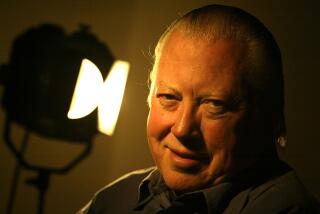Legacy of Inspiration
- Share via
Tune into a PBS station during the day and there’s “Mister Rogers’ Neighborhood,” with beloved TV icon Fred Rogers. The shows, with their quiet reassurance, emotion-exploring songs and puppet vignettes, are the self-effacing legacy of Rogers, who died in February.
So is what was behind the creation of each episode: the nurturing and protection of children, a dedication that has influenced a new generation of such critically acclaimed preschoolers’ shows as “Blue’s Clues” and “Bear in the Big Blue House.”
How long that legacy will last and how far it will extend are unknown, but Rogers’ nonprofit Pittsburgh-based production and education company, Family Communications Inc., has several Rogers-inspired projects in the works; and this month, Rogers’ widow, Joanne, is taking a brief and unaccustomed place in the spotlight to talk about a new book, “The World According to Mister Rogers: Important Things to Remember,” published by Hyperion Books and due out Wednesday.
“I take it with me everywhere,” she said, speaking from the Family Communications offices, “with all my paper clips in it to mark my favorite [passages]. I had to start putting two paper clips on the really, really special ones. It’s pretty fat because of that.”
Intended as an inspirational tome for adults, the small book, arranged in sections called “Understanding Love,” “The Courage to Be Yourself,” “The Challenge of Inner Discipline” and “We Are All Neighbors,” is a compendium of Rogers’ humanity-affirming thoughts and observations.
It includes lyrics to a few of his trademark message songs from the “Neighborhood,” anecdotes, his powerful acceptance speech on the occasion of his induction into the Television Hall of Fame in 1999 and some of the many quotes that he collected over the years that struck him as wisdom to live by.
Family Communications is donating the profits from its sale to the Fred Rogers Fund for work that furthers the “healthy emotional, social and intellectual development of children.”
With initial trepidation -- “I’m not even good at writing letters, but I think Fred must have been with me” -- Joanne Rogers wrote the book’s introduction, a loving tribute to the man who “was my icon first.”
She writes of how they met in 1951 as music students in college, how Rogers came to follow his unswerving path to serve children and do good in the world and how Rogers, an ordained Presbyterian minister, privately prayed each day for a long list of “people and things” but “always ended up with ‘and all the peacemakers of the world.’ ”
She also writes about one of their strongest bonds: They loved to make each other laugh.
“He maintained that wonderful sense of humor right to the end, for as long as he was able to talk,” she said.
Her youthful voice, warmed by a comfortable Southern accent, revealed more than a touch of the famously deliberate “Mister Rogers” cadence as she described how her husband and their grandsons “always got a great kick” out of the trademark Monty Python sketch about the Spanish Inquisition, in which the supposedly torturous device is a “comfy chair.”
She said at one point during Fred Rogers’ brief, private struggle with stomach cancer at the beginning of this year, “when he was so weak that with help he could barely make it over to the chair, I said, ‘If you’d just sit for a minute in the “comfy chair” while we get the bed changed,’ and he said, ‘No, not the comfy chair!’ And we laughed....
“I ... I do miss him,” she said. “But he’s everywhere, he’s all around me, especially when I’m at home. Sometimes it surprises me that his physical presence isn’t there.”
Although Joanne Rogers has performed concerts and conducted master classes as part of a duo-piano team since the mid-1970s, she’s never been in the public eye as Mrs. Fred Rogers. (When their two sons were small, “Mister Rogers” was “Daddy” at home, and “the other Daddy” on television.)
“He was very protective,” she said, “and he had colleagues who respected that and helped him to protect the family” -- which grew by one, a week after Rogers died Feb. 27, with the birth of a third grandchild.
Among those colleagues is the tight-knit group at Family Communications. In addition to producing the “Neighborhood,” it has created educational and support materials for parents and educators and for such groups as the American Cancer Society, migrant children and children in domestic abuse shelters.
It is working to secure funding to expand its series of in-person workshops for adults called “What Do You Do With the Mad That You Feel?,” created with Fred Rogers’ input, to help teach preschoolers ways to control their anger, an increasing concern for teachers and child-care providers. So far the workshops have been hosted by PBS stations in three states as part of the network’s “Ready to Learn” project, including several in California this year funded by a one-year federal grant.
According to Lynne Christian, associate director of community outreach at Los Angeles-based PBS station KCET, the reaction to the workshops was overwhelmingly positive.
Participants, Christian said, “thought it was very important [and that discussions] about anger management, conflict resolution and strategies were really valuable.”
“We’re trying to continue Fred’s commitment to the developmental perspective,” said Sam Newbury, director of production at Family Communications. “We’re just starting a project called Foundations of Literacy to create material for college-level early childhood classes using new media technology, DVD and the Web, involving Fred’s approach.
“We’re also doing a project to encourage girls to remain committed to math and science; and we’re going to do some preschool material for child-care providers about how preschoolers’ curiosity and [sense of] inquiry can be encouraged. We will for sure use segments from the ‘Neighborhood’ ” for that.
In “The World According to Mister Rogers,” Joanne Rogers chose three words to define the “Mister Rogers” she knew: “Courage, love and discipline.”
“I was trying to decide which of those characteristics described him the best,” she said, “and which would come first. I decided that to have done the things he did, to live the life that he tried to live, courage would be the most important one.”
More to Read
Sign up for our Book Club newsletter
Get the latest news, events and more from the Los Angeles Times Book Club, and help us get L.A. reading and talking.
You may occasionally receive promotional content from the Los Angeles Times.










